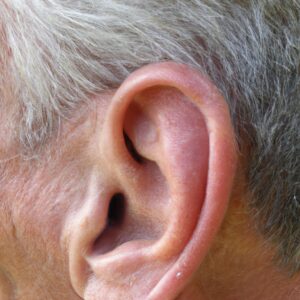Introduction: Human Hearing
Our ears

The human ear is our organ of hearing, which makes it possible to perceive sounds. In addition to hearing, our sense of balance is also located in the ear. When we understand how healthy hearing works, we can better appreciate its importance and maintain the health of our hearing for a lifetime.
The ear consists outwardly of three main parts – the auricle, the ear canal and the eardrum. The auricle is the visible part of the ear that is located outside the head. The ear canal connects the auricle to the eardrum, which vibrates when sound waves penetrate. The eardrum is a thin and sensitive membrane that can be damaged by foreign bodies and pathogenic germs.
The oscillation of the eardrum travels through three small bones in the middle ear to the inner ear, where it is converted into electrical signals and transmitted via the auditory nerves to the auditory center in the brain for interpretation. This is where the sensory impression of hearing arises.
The sense of hearing
The sense of hearing has some important functions. Those who lose it have to live with serious restrictions that are noticeable socially, professionally and in everyday life. Our sense of hearing gives us 360° orientation. We hear people even when we don’t see them. We hear the traffic. And we hear hidden dangers and can adapt to them.
Like our eyes, our sense of hearing works in 3D. This is because man naturally has two ears. It can therefore distinguish left and right and detect movements of noise sources. The structure of our ears is also geared towards three-dimensional hearing. The auricle is directed forward – so we can control where in the room we want to hear sounds particularly well. However, the auricle also changes rear sounds, so that we can even tell whether a noise is coming from the front or back. Even the skull structure has an influence on our hearing, because the cranial bones conduct sound and change the impression of our auditory center in the brain.
Deafness has a profound effect
Not seeing separates from things,
(Immanuel Kant)
not hearing separates from people.
Deafness — or rather, deafness — can have a profound impact on a person’s social life. Deaf and hard of hearing people have difficulty communicating with others who are not used to dealing with deafness. Those who have healthy hearing cannot put themselves in the position of hearing-impaired fellow human beings so well.
Deafness also entails risks that make certain activities seem particularly dangerous. Team play is made more difficult and you have to resort to other senses. All this promotes the isolation of those affected and the exclusion of activities – including social activities. This can also lead to feelings of rejection and frustration, as well as difficulty building relationships and finding work.
Fortunately, technological advances such as cochlear implants and sign language have opened up new ways for deaf people to interact with the hearing world. The development of social acceptance and technical aids is far from complete.
The sense of balance
In addition to hearing disorders, diseases of the ear can also lead to balance disorders. The sense of balance is a complex sense that allows us to move safely and accurately in the environment. It is essentially controlled by the organ of balance, which is located in the inner ear. The organ of balance helps us to keep our position in space and prevents us from falling or getting dizzy. This sense is also required a healthy hearing.
The inner ear is responsible for detecting changes in body position in space. Information from the inner ear about the position of our body in relation to gravity and other forces is sent to the brain. At the same time, the eyes provide visual information about our position in the room. It is a combination of these two senses that helps us to maintain our balance and react correctly to our position in space, for example to intuitively protect ourselves from a fall through compensatory movements.
Inner ear disorders can lead to loss of balance, dizziness, nausea, and other problems related to the sense of balance. The better we understand how this organ works and how it affects our ability, the better we can maintain the health of hearing and its senses (sense of hearing and balance).
Deafness does not automatically lead to a loss of balance, but inner ear defects (infarctions, infections and the like) are capable of affecting both senses. Another cause of inner ear impairment can also be certain medications.
Risk factors that threaten healthy hearing
Noise – the number 1 risk factor
Hearing is an important part of our daily lives and it is important to take steps to maintain healthy hearing. Hearing protection is one of the most important steps to ensure healthy hearing. This includes avoiding harmful environments and using earplugs or other protections in noisy environments such as concerts or sporting events.
In addition to wearing hearing protection, it is also important not to listen to loud music for long periods of time and to take regular breaks from using headphones or earbuds. Those who like to listen to music or radio on the go with earphones or headphones are tempted to outdo the noise of cars, trains or construction sites. This behavior is dangerous for hearing because it regularly leads to overload.
Lifestyle habits that can damage hearing
Other tips for maintaining healthy hearing include avoiding smoking, reducing stress, eating a balanced diet with plenty of fruits and vegetables, regular exercise, and regular check-ups with a hearing care professional. If you ask people about risk factors for our hearing, then usually only the noise and loud music is mentioned.
Not to be neglected are also the following risk factors, because they can have a great influence on our hearing health.
Smoking: poison for hearing

Smoking is a serious health risk that can wreak havoc on our bodies, and hearing is no exception. The toxins found in cigarettes can damage the throat, ears and even the inner ear and lead to hearing loss.
It is estimated that millions of people worldwide suffer from hearing loss due to the involvement of smoking . Smoking—especially the neurotoxin nicotine—not only directly damages the ear, but also affects other parts of our bodies that are essential for healthy hearing, such as our blood vessels, nerves, and even our brain.
The damage caused by smoking is associated with an increased risk of age-related hearing loss as well as an increased risk of noise-induced hearing loss. It is important that smokers are also aware of this risk so that they can take steps to protect their hearing from further harm.
Medications that can damage hearing

Hearing loss caused by medication is a serious problem that can have a major impact on the quality of life of chronically ill patients. There are many drugs on the market that can cause hearing damage. In the U.S. alone, there are more than 200 drugs that can cause hearing loss. The situation in Germany is comparable.
Such medications range from antibiotics and chemotherapy drugs to over-the-counter medications such as ibuprofen and aspirin. Other groups of drugs that can lead to or promote hearing loss are antihypertensive drugs or heart failure drugs.
Being aware of the potential risks to the ears associated with these medications and taking steps to protect hearing is important for doctors and patients alike.
Sudden hearing loss: the infarction in the inner ear
A sudden hearing loss is an infarction in the inner ear that can lead to sudden and chronic hearing loss – or at least a great permanent burden for those affected. The three most important risk factors for sudden hearing loss are age, cardiovascular disease and cardiovascular medications.
To prevent sudden hearing loss , it is recommended to treat and control risk factors such as high blood pressure and cardiovascular disease. A healthy lifestyle, such as regular exercise and a balanced diet, can also help reduce the risk of sudden hearing loss. At the same time, antihypertensive drugs can also impair hearing. An early, conscious lifestyle can prevent you from being caught between risky medication and risky lifestyle.
The therapy of sudden hearing loss usually consists of corticosteroids, which have an anti-inflammatory effect and can improve blood circulation. In some cases, treatment with vitamins, especially vitamin B12, can also help.
If chronic symptoms and impairments remain, dealing with the consequences of sudden hearing loss can be difficult for those affected. In this case, hearing aid fitting or cochlear implantation can help improve hearing. Support from speech therapists and hearing therapists can also be helpful in improving communication skills and quality of life.
5 tips for healthy hearing
1. Prevention of noise
One of the most important ways to protect hearing is to avoid noise that is too loud. This includes staying away from loud noises and wearing earmuffs when in noisy environments. Noise levels above 85 decibels can damage the ear.
Repeated or long-lasting noise exposure, such as in factories, construction work, music events or sporting events, is particularly dangerous. Long-term exposure to high noise levels can cause permanent damage to the inner ear, which can lead to hearing loss.
2. Avoiding harmful drugs
Some medications can damage hearing, especially when taken in high doses or for long periods of time . Medications such as antibiotics, painkillers, antihypertensive drugs, and even some over-the-counter medications can damage the ear.
Before taking any medication, you should make sure that it has no known effects on hearing and, if you do, discuss them with a doctor. The doctor can then decide whether it is safe to take the medication or whether an alternative therapy is an option.
3. Healthy lifestyle habits
Smoking, alcohol abuse , and stress can increase the risk of sudden hearing loss and affect overall ear health. Smoking impairs blood circulation and can damage the ear. Alcohol abuse can affect the ear and balance. Stress can affect the immune system and affect blood circulation.
We recommend avoiding or reducing these behaviors and maintaining a balanced diet, enough sleep, and regular exercise to support and protect the ear. Meditation exercises or yoga can be very helpful for weaning or stress reduction. Read more about it in our magazine.
4. Sport/Exercise
Regular exercise can help improve blood flow to the ear, thereby reducing the risk of sudden hearing loss. Sport and exercise not only support general health, but also blood circulation and thus the supply of nutrients and oxygen to the ear.
It is therefore advisable for healthy hearing to schedule at least 30 minutes of moderate exercise per day , such as walking, cycling, swimming or other aerobic activities. This not only helps protect the ear but also improves overall health.
5. Preventive examinations
Regular screening of hearing, especially in people over the age of 50 or in people at risk for hearing loss, can help detect and treat hearing problems early.
A check-up usually includes a hearing test, an examination of the ear and, if necessary, an anamnesis. It is recommended to have a hearing test every 10 years or more often, depending on risk factors. This makes it possible to detect and treat hearing problems at an early stage before they lead to permanent hearing loss.
